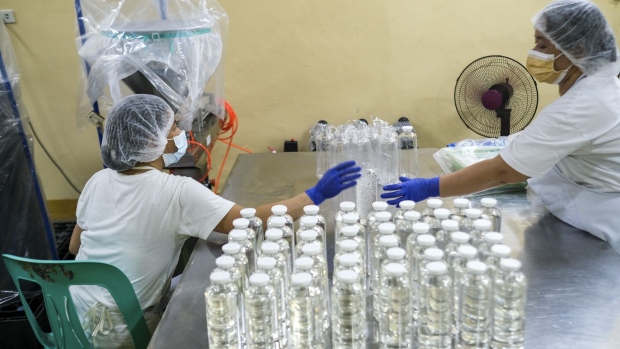Feb 1, 2023
Global Health Craze for Coconut Oil Spurs Philippine Output Push
, Bloomberg News

(Bloomberg) -- The Philippines, which vies with Indonesia as the top producer of coconut oil, is embarking on an ambitious program to boost output, betting on booming demand for the commodity used in food, lipsticks and biofuels.
The government is helping farmers to plant hybrid coconut seeds that will bear fruit quicker and double yields, said Bernie Cruz, head of the Philippine Coconut Authority. The Southeast Asian country wants to stay ahead of Indonesia, which is fast catching up, after typhoons and pests ravaged Philippine plantations.
The plan, which will be implemented during the term of President Ferdinand Marcos Jr. through 2028, could push more of the tropical oil into a well-supplied global market. Prices of coconut oil have tumbled about 60% since March, mirroring a slide in rival palm oil as Indonesia boosted exports. Coconut oil is the Philippines’ top agricultural export with $2 billion of sales last year.
Coconut oil, once considered exotic outside of the tropics, is showing up in supermarkets and health food stores everywhere. It has a variety of uses: as cooking oil for baking and frying, in personal care products such as lipstick and shampoo, or as biofuel when blended with diesel.
Cruz expects demand to continue surging, especially for products like virgin coconut oil. The growing popularity of plant-based food and cosmetics as consumers increasingly seek out vegan and organic products will also help.
Last year, the Philippines exported around 1.15 million tons of coconut oil, up 31% from 2021, according to Yvonne Agustin, executive director of industry group United Coconut Associations of the Philippines. She expects exports to climb further this year. Most of the volume goes to the US and Europe.
Production and yields need to keep up. Each tree in the Philippines produces about 44 coconuts a year, less than half the amount in Indonesia and India, said Cruz. There are 365 million coconut trees planted across an area of 3.6 million hectares in the country.
Super typhoons, as well as a major pest outbreak, destroyed millions of trees in the Philippines. The impact was particularly devastating in the southern Mindanao island, where more than half of the country’s output is from. Oil is produced from copra or the dried coconut meat.
“The biggest challenge is to improve the yield,” said Cruz, who was an agrarian reform secretary before taking on his current job. “We really need to fix the industry. It’s still our No. 1 dollar earner of all agricultural products,” he said in an interview.
The target is to double yields through replanting trees and producing coconuts in four to five years, from seven years currently. The industry is also focused on producing higher-value products, including a building board material from coconut husks, and lambanog, a coconut liquor dubbed as the Philippine vodka.
Unilever Indonesia is also keen on buying Philippine coconut sugar for its soy sauce product, Cruz said. “We have to move up the value chain,” he said.
©2023 Bloomberg L.P.





